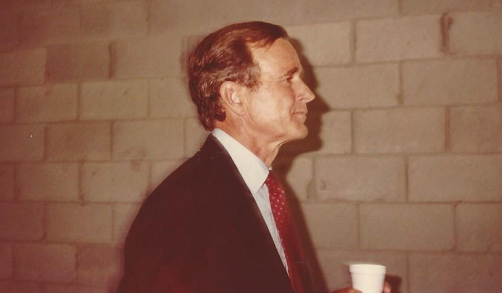Never has a reluctant second choice so momentously changed world history.
George H. W. Bush entered the Republican National Convention in 1980 looking like a beaten man. He had finished a fairly distant second to Ronald Reagan in the hunt for delegates for his party’s presidential nomination, and Reagan himself had been serially angered by and/or unimpressed by his patrician opponent.
The haze covering Bush now obscures the reality that Bush the candidate had sharp elbows, such that several of that year’s other also-rans were none too fond of him, either. (For a particularly vivid example, read about the exchange between Bush and Sen. Bob Dole at a now-famous New Hampshire debate in Rendezvous with Destiny, Craig Shirley’s absolutely essential book on that year’s campaign.)
So, as Reagan and his political strategists considered who to choose as the Gipper’s running mate, few of them wanted Bush. The candidate’s wife, Nancy, reportedly favored Sen. Paul Laxalt. The convention floor was on fire with demonstrations for charismatic U.S. Rep. Jack Kemp. Indiana Sen. Richard Lugar and former White House chief of staff Donald Rumsfeld were seen as safe choices. And, at first secretly, some in the Reagan team had begun quiet negotiations with former president Gerald Ford, for what would be a stunning return to the role of Number Two for somebody who already had served in the Oval Office.
Granted, an NBC survey of three-quarters of the delegates showed Bush to be the first choice for vice president of a large plurality of them, but their passion paled badly in comparison to the Kemp backers. Bush seemed like an also-ran, with no “buzz” and few prospects for the spotlight.
I was a 16-year-old page at that convention in Detroit, and the “holding room” for the pages was in the same back hallway (behind the stage area of the Joe Louis Arena) through which VIPs and convention officials walked. I was not shy about approaching VIPs (if they didn’t look too busy) and asking to take photos with them; after all, just about everybody wants to encourage polite young people to engage in politics.
So it was, a day or two before Reagan was to make his choice for running mate, that Ambassador Bush wandered rather sullenly down that hallway. Unlike virtually every other bigwig at the convention, Bush had no aides or hangers-on accompanying him, no admirers trailing him, and no purposeful spring in his step. Frankly, he looked bored and unhappy, like a man just going through the motions while dutifully trudging towards some rather pro forma meeting.
So, as I approached him in his solitary walk down the drab convention back hallway, he just didn’t look like a man who wanted to be bothered. It wasn’t that there was any “stay away” edginess to his demeanor; it was just that he looked, well, a bid forlorn, and lost in his thoughts.
That’s why, rather than ask for a photo with him, I pulled up about three feet short and just took a “candid” as he ambled past. Even at that proximity, I think he was completely oblivious to the kid (me) in the page uniform with camera in hand.

It looks like a picture of a man who, at least temporarily, is going nowhere. But two days later, the by-then open negotiations between Reagan and Ford fell through. In one of the most dramatic Veep-selection dramas in American political history, Reagan somewhat reluctantly chose Bush as the choice most likely to keep the Republican Party united for the fall campaign.
Suddenly, the apparently beaten man in my photograph was back at center stage. And Bush made the most of it. He served loyally and well as Reagan’s vice president; he won the presidency and helped usher out the Cold War while winning a hot war against Iraqi aggression. And, of course, left a political legacy strong enough for one son to become governor of one of the nation’s most populated states while another son became a two-term U.S. president in parlous times.
Sometimes, political fortunes can change in an instant — and history with them. It often happens only after somebody has walked the walk, trudged through lean times, and attended an endless string of dull meetings.
But for fortune to shine, it sure helps if somebody, through long and honorable service, has put himself in the arena. By that day in Detroit, George H.W. Bush already had done so unsparingly. That’s why he was in position to be Reagan’s obvious choice when the time for a cogent decision finally came, and eventually to lead a great nation with wisdom.
